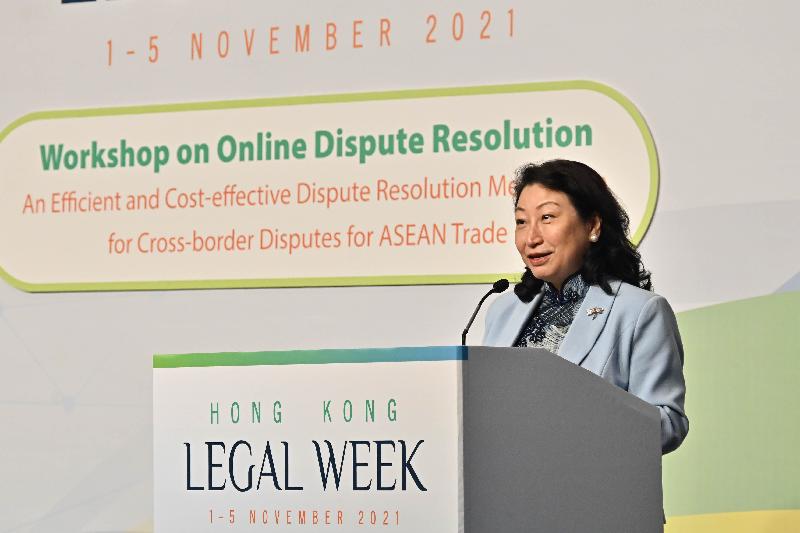Following is the speech by the Secretary for Justice, Ms Teresa Cheng, SC, at the Workshop on Online Dispute Resolution: An Efficient and Cost-effective Dispute Resolution Mechanism for Cross-border Disputes for ASEAN Trade under Hong Kong Legal Week 2021 today (November 3):
Distinguished guests, ladies and gentlemen,
Good morning. On behalf of the Department of Justice of Hong Kong, China, it is my great pleasure to welcome you all to the Workshop on Online Dispute Resolution with the theme "An Efficient and Cost-effective Dispute Resolution Mechanism for Cross-border Disputes for ASEAN Trade". With this Workshop being the first phase, we plan to organise the second phase of this Workshop when travel restrictions have hopefully eased next year in order to welcome you and all participants from ASEAN (Association of Southeast Asian Nations) member states in particular to gather physically here in Hong Kong.
Trading between Hong Kong and ASEAN
Despite the global downturn brought about by the COVID-19 pandemic last year, in the age of digitalisation, e-commerce transactions have grown exponentially worldwide with the extensive use of the Internet to conduct business transactions remotely. Under the Free Trade Agreement and the related Investment Agreement between ASEAN and Hong Kong, China, cross-border trading between Hong Kong and ASEAN continues to flourish. The total value of merchandise trade between Hong Kong and ASEAN has grown to HK$1,034 billion in 2020, with total merchandise trade growing 1.6 per cent (Note 1).
Difficulties ASEAN traders are facing
The growth in trade, especially through regional e-commerce, has inevitably led to more cross-border disputes. Traditional means of resolving disputes by cross-border litigation are not a real option for micro, small and medium-sized enterprises (MSMEs), who often face financial constraints in hiring legal representation and struggle to survive a lengthy court procedure (Note 2). Staggering legal and travelling costs, coupled with language and cultural barriers, pose great difficulties for traders to obtain access to justice through domestic courts. Thus, there is a pressing need to provide traders with an avenue to obtain access to justice in a time-efficient and cost-effective manner, and this is where online dispute resolution (ODR) comes into play.
As a structured online platform, ODR automates traditional alternative dispute resolution methods such as negotiation, mediation and arbitration, and may provide additional features to suit the needs of MSMEs (Note 3). Expeditious and affordable ODR services will improve MSMEs' accessibility to justice and alleviates traders' financial burden. This in turn boosts businesses' competitiveness and enables traders to explore new cross-border business opportunities. The acceleration of cross-border trade will enable MSMEs to thrive, expand their network into international markets and contribute to the ASEAN economy.
How ODR can assist cross-border trade for ASEAN
Following the adoption of the UNCITRAL (United Nations Commission on International Trade Law) Technical Notes on ODR, the United Nations General Assembly observes that "online dispute resolution can assist parties in resolving the dispute in a simple, fast, flexible and secure manner, without the need for physical presence at a meeting or hearing" (Note 4). In 2019, the Asia-Pacific Economic Cooperation developed the Collaborative Framework for Online Dispute Resolution of Cross-Border Business to Business Disputes to help global businesses, in particular MSMEs, resolve business-to-business cross-border disputes focusing on low-value disputes.
On the ASEAN front, the ASEAN Economic Community Blueprint 2025 highlights the development of a regional legal framework for ODR for facilitating e-commerce transactions in ASEAN (Note 5). Similarly, the ASEAN Strategic Action Plan for Consumer Protection 2025 also set the goal to enhance consumer confidence and cross-border commercial transactions through addressing cross-border complaints through ODR in its Strategic Goal 3 (Note 6). This shows that the growing importance of ODR in doing business within and with ASEAN cannot be ignored.
Hong Kong's initiatives
It is imperative for ODR initiatives in Hong Kong to grow and be driven to assist in enhancing trade with ASEAN countries, as well as enhancing access to justice. To this end, eBRAM has been established in Hong Kong to provide a full spectrum of ODR services to assist parties to resolve disputes via a secure and user-friendly online platform. We have also set up the Inclusive Global Legal Innovation Platform for Online Dispute Resolution, the iGLIP on ODR, in collaboration with the UNCITRAL, to keep track of the latest developments in the ODR landscape and develop innovative legal tools to address potential issues. We hope that our initiatives in contributing to an innovative and comprehensive ODR network will further facilitate the ECOTECH (Economic and Technical Cooperation) collaborations between ASEAN and Hong Kong, China.
Finally, I would like to thank the ASEAN Secretariat for their support, and I hope to personally welcome you all to Hong Kong at Phase II of the Workshop next year. May I wish you all insightful and fruitful exchanges this morning. Thank you very much.
Note 1: Paragraph 3 of LC Paper No. CB(1)518/20-21(03)
Note 2: Michael J. Dennis, "APEC Online Dispute Resolution Framework", International Journal of Online Dispute Resolution, 2019, p. 140
Note 3: Jean-François Roberge & Veronique Fraser, "Access to Commercial Justice: A Roadmap for Online Dispute Resolution (ODR) Design for Small and Medium-Sized Businesses (SMEs) Disputes", 2018, pp. 30-31
Note 4: GA Resolution 71/138, UNCITRAL Technical Notes on Online Dispute Resolution, December 13, 2016
Note 5: ASEAN Economic Community Blueprint 2025, paras. 52-53
Note 6: aseanconsumer.org/cterms-regional-cooperation-in-asean/asean-strategic-action-plan-on-consumer-protection-asapcp-2016-2025
Follow this news feed: East Asia






